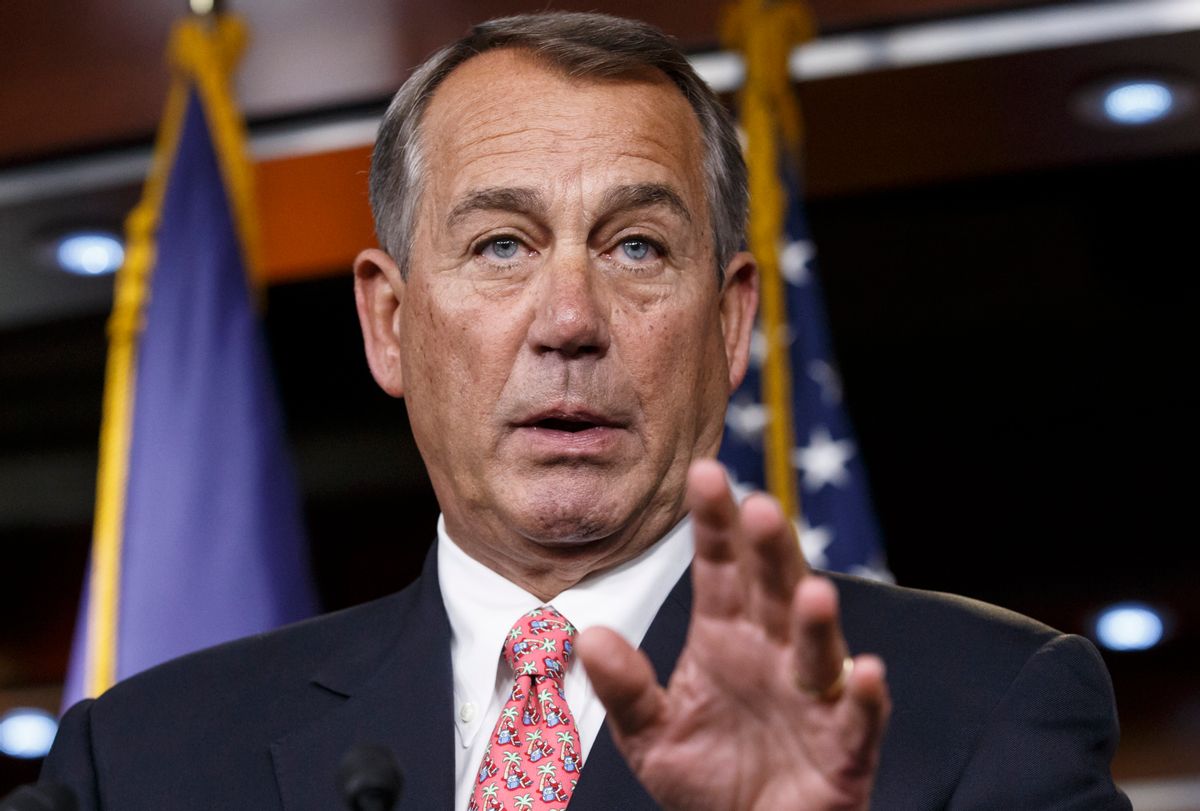With just a few days to go until the government once again shuts down as a consequence of Republican intransigence, it’s becoming increasingly clear that everything will come down to what Speaker John Boehner decides to do. Boehner has said publicly that he doesn’t want a shutdown, but to date he’s failed to offer a plan for keeping the government’s lights on over the objections of House conservatives, who want to hold federal funding hostage until Planned Parenthood loses its government subsidies.
On the Senate side, there doesn’t seem to be a great deal of uncertainty as to how Republican leader Mitch McConnell will proceed. He’s expected to move to pass a clean bill authorizing continued government appropriations after a perfunctory effort to defund Planned Parenthood fails. Ted Cruz has threatened to throw as many obstacles as he can in McConnell’s way as part of his effort to rally conservatives behind his presidential campaign, but it’s not clear that he’ll have much success.
If McConnell and the Senate GOP leadership can get a clean funding resolution passed, all the pressure will fall on Boehner, who will be forced to make a decision before the Septe. 30 deadline passes: Does he work with Democrats to get a clean funding bill passed and risk enraging his own caucus, or does he succumb to pressure from the hardcore conservatives in the House Freedom Caucus and permit the government to shut down?
That’s not an easy choice and both carry political risks for Boehner. But, as Stan Collender writes, if Boehner’s chief motivation is political self-preservation, then a shutdown seems extremely likely:
This is the alternative that so far has gotten no attention, but there is a real possibility a government shutdown will be just what Boehner needs to survive as speaker and get a clean CR through the House.
The shutdown would appease the Freedom Caucus and defuse its effort to replace the speaker because Boehner would be doing what the caucus wants by refusing to bring a CR to the floor that maintains funds for Planned Parenthood. A few days or a week later when the appetite for a shutdown has changed, Boehner would be able to do what he’s done on several past budget-related bills: say they fought the good fight, that the fight will continue in other ways and get permission from the GOP caucus to work with Democrats to pass the CR.
A shutdown is almost certain to happen if Boehner concludes it will be good for him personally.
I don’t think it’s quite right to say that the House Freedom Caucus will be “appeased,” given that the logic underlying these shutdown fights is that they’ll achieve the desired policy goal so long as the GOP has the stomach to endure the short-term political damage that invariably ensues. A few weeks of brutal poll numbers will make it easier for Boehner to move to fund the government, but it will still be viewed as a capitulation to the Democrats – at least, that’s how Ted Cruz and the House Freedom Caucus would frame it.
But this makes sense as an outcome. A good number of Republicans and conservatives remain convinced that shutdowns are harmless in the long run, given that they shut the government down in late 2013 and then romped to victory in the midterms a year later. And if Boehner really feels threatened in his speakership, he might see this as the easiest path to getting what he wants with as little political harm as possible.
Of course, if that is what happens, then we can consider ourselves well and truly screwed and completely dispense with any hope that the government will function in a normal, healthy way any time soon. First off, it’s worth remembering that the impact of a government shutdown extends well beyond the political realm. If the government’s funding isn’t renewed in the next few days, many millions of people could lose their SNAP benefits for the duration of the shutdown, and those people will have to forgo eating because Boehner and the Republicans prioritized a hopeless fight over Planned Parenthood and their own political positions.
More broadly speaking, the more we go down this shutdown road, the higher the risk it happens again. Conservatives remain convinced that shutdowns are a prudent vehicle for achieving policy objectives despite the fact that they have never, ever worked. They’ll keep finding ways to rationalize these massive disruptions to government operations. And, absent a massive political realignment, it seems likely that the House will remain in the hands of Republicans for many years to come. Whoever leads the House is going to face the same pressures that Boehner has faced for almost five years now. If shutting down the government comes to be viewed as a way to defend one’s position in the leadership against conservative revolts, then why wouldn’t a threatened speaker let funding lapse every now and again to preserve his or her throne?
Regardless of what happens, the Republicans have failed horribly at living up to their 2014 promises of competent governing. We already had one near-shutdown earlier this year, and it’s looking like we might have another full-blown shutdown in the next few days. It’s a breakdown of basic governance, and there isn’t much hope that things will get better soon.

Shares